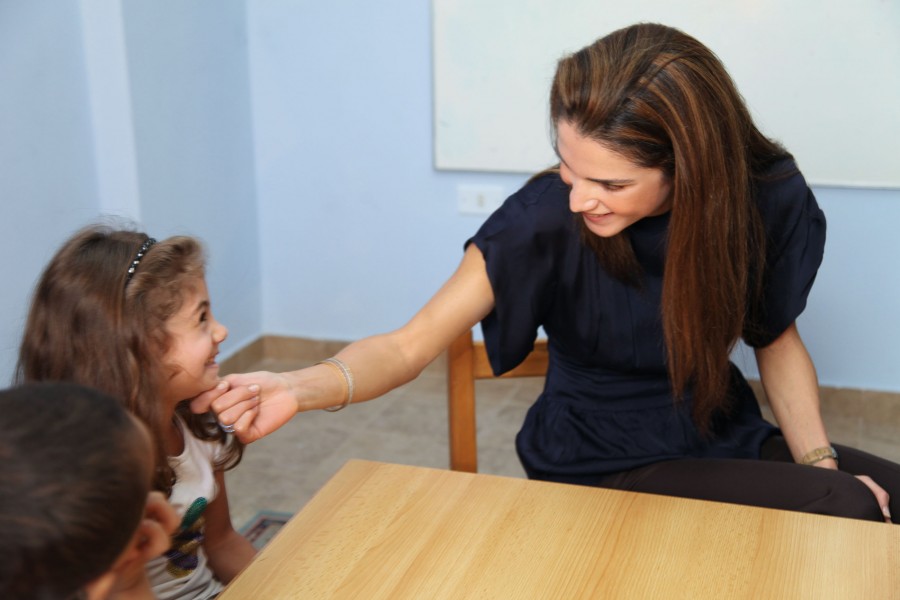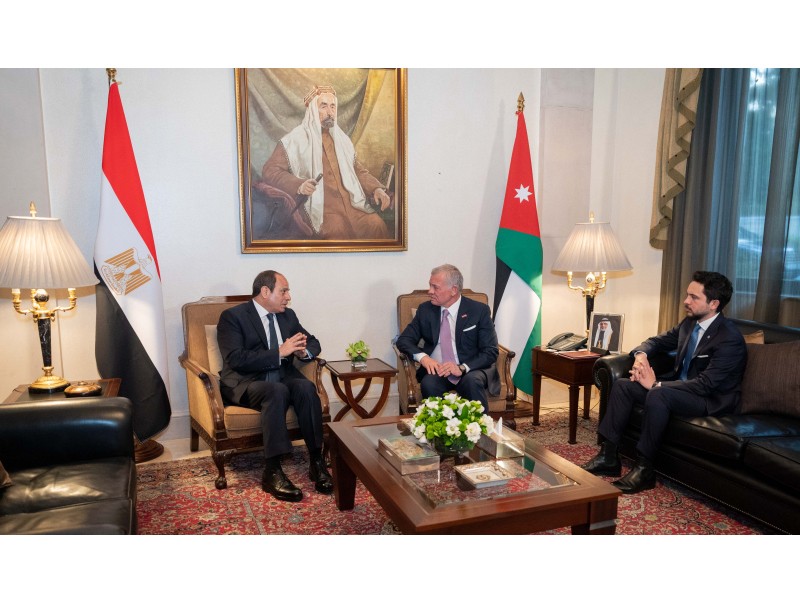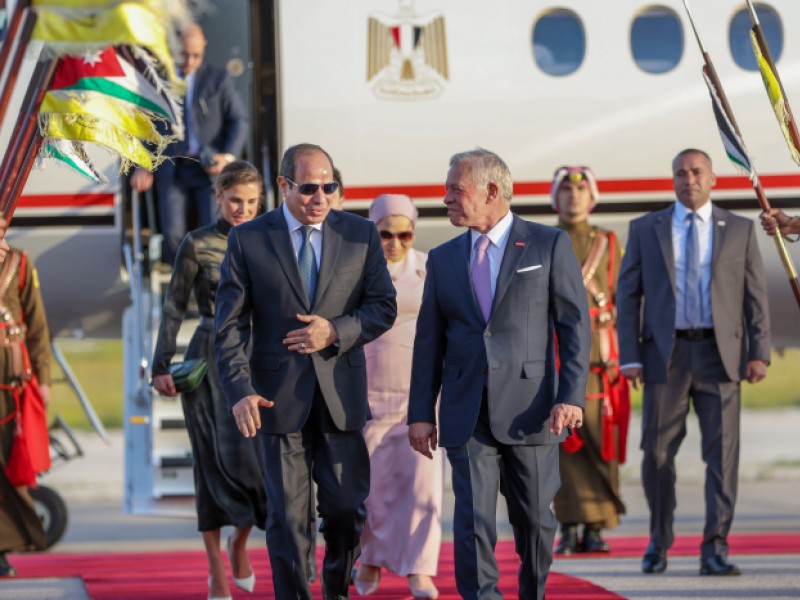Queen Rania attends 'Women and Armed Conflict Resolution' Forum in Beirut

(Office of Her Majesty, Press Department - Beirut) Her Majesty Queen Rania Al-Abdullah, President of the second Arab Women’s Summit (2002 –2004) chaired the first meeting of the Arab Women’s Organization’s Higher Council with the participation of Arab First Ladies of countries that ratified the establishment of the AWO.
The meeting was attended by Queen Rania, President of the AWO Higher Council (2003-2005), as well as First Ladies Suzanne Mubarak of Egypt, Asma Al Asad of Syria, Ms. Fatima Bashir of Sudan, Sheikha Sabika Bint Ibrahim Al Khalifa of Bahrain, and Ms. Andreh Lahoud of Lebanon.
Speaking at the meeting, Queen Rania said the AWO represents a new era in inter-Arab cooperation to further women’s issues stressing that the organization will coordinate with NGOs, institutions and experts to advance the mission of the organization.
She said the AWO’s strategies should take into consideration the specifics of each country with the aim to empower Arab women, encourage their participation in the development process of their communities and draw unified strategies to improve the status of women in the Arab World.
Established in March 2003 in Amman, and operating under the umbrella of the Arab League, the AWO now groups the United Arab Emirates, Bahrain, Tunisia, Algeria, Syria, Sudan, Oman, Palestine, Lebanon, Egypt, Yemen and Jordan.
The AWO is the outcome of fruitful efforts of the Arab Women’s Summit and builds on ensuring greater Arab women’s cooperation and integration as well as furthering inter-Arab cooperation and synchronizing the Arab stance on both regional and international arenas. The organization also aims to address women’s issues in regional and international forums in order to raise awareness on the situation of Arab women.
AWO seeks to achieve women’s empowerment through policies furthering legislation based on equality and competence, integrating women’s issues within the priorities of comprehensive development schemes, raising grassroots awareness on issues pertaining to women and their ability to participate in decision-making on all levels to enhance their role within the family and society.
Monday’s meeting ratified bylaws and internal structure, envisaged plans, projects and the budget of the AWO which seeks to address challenges facing women on all levels preventing their full participation in the development of societies. The meeting outlined mechanisms to develop these policies taking into account the special and specific needs of each country.
Other issues addressed where eliminating illiteracy, developing programs that deal with preventive health measures and incorporating them in programs targeting community development, raising awareness on environment and its effect on health, fighting the negative stereotypes of Arab women in addition to increasing and encouraging their participation in the political arena.
Queen Rania had announced the launch of the Arab Women’s Organization during the first meeting of the organization’s Executive Council in Amman last year, where she stressed that the AWO would serve as the backbone of the Arab Women’s Summit and support it with solid initiatives, expressing her confidence in the Council’s ability to develop a framework that would help translate the AWO’s vision into action on the ground for the benefit of women in the Arab world.
Also on Monday, Queen Rania attended the proceedings of “Women and Armed Conflict Resolutions” Forum which brought participants including Arab First Ladies among others to discuss legislation pertaining to women in conflict situations as well as psychological, social, economic, and political conditions during conflicts as well as ways to empower Arab women to participate in building a culture of justice and peace.
The Forum also tackled family issues and women’s role in furthering education and ways to combat consequences resulting from armed conflict on both women and youth and showcased legislation and international agreements on human rights specially those affecting victims of armed conflicts.
Speaking at the opening of the conference, Ms. Andreh Lahoud stressed that societies could not be developed with half of its population inactive, adding that women’s rights were part of human rights that should be furthered worldwide.
In her speech, Ms. Mary Banotti of the European Parliament stressed the need for such conferences to bridge the gap between the West and Arab countries. She added that many clichés on Arab women are challenged by the participation of politicians, academics and activists in high-level gatherings that would have their positive impact on the development of societies.
The Euro Parliament member from Ireland noted that education and awareness were vital to get women’s voices heard in all spheres adding that women’s rights were part of universal rights.
The opening session also included speeches by the Arab League, and included participants from 16 Arab countries as well as organizations such as ESCWA, UNIFEM.
Jordan’s delegation to the two-day conference included Dr. Ruweida Ma’yata, President of the executive committee of the Arab Women’s Summit and the executive committee of the AWO, Dr. Amal Sabbagh, secretary general of the Jordanian National Commission for Women, Taghrid Hikmat the first Arab woman to be appointed to the International Criminal Tribunal for Rwanda by the United Nations General Assembly in June 2003, Dr. Ibrahim Badran, assistant director of international relations at Philadelphia University, as well as Suha Shami, an MA student of Women’s Studies from the University of Jordan.
The “Women and Armed Conflict Resolutions” Forum was the part of gatherings organized in different Arab countries as part of functions stemming from the Arab Women's Summit. Queen Rania had attended the “Women and Education” Forum in Damascus last February. Among the topics discussed were women and education, women and social development as well as cultural challenges facing women.
Before departing to Amman, Queen Rania visited the International College campus, a school founded in 1891, with the mission of educating self reliant students capable of initiative, critical thinking through the education the whole person. The school’s curricula and objectives seeks to graduate students who espouse self discipline, are aware of the interdependence of nations, and have a set of values and respect for others.
Queen Rania met with administrators, toured classrooms and exchanged talk with students at the school that was set up in 1936 as an American University of Beirut affiliate before separating in 1960 to become a co-educational institution.
Queen Rania was briefed on the school’s objectives which maintain a high standard of educational programs, offering faculty and staff opportunities to advance their knowledge and skills and promote professional growth through the Educational Resource Center.
The broad education strategy of the school has been focused on the International Baccalaureate, IB Primary Years Program and the new Lebanese curriculum based on integration of information technology into the learning process.
Featured
Queen Rania's official website
This website does not support old browsers. To view this website, Please upgrade your browser to IE 9 or greater
Your browser is out of date. It has known security flaws and may not display all features of this and other websites. Learn how to update your browser



